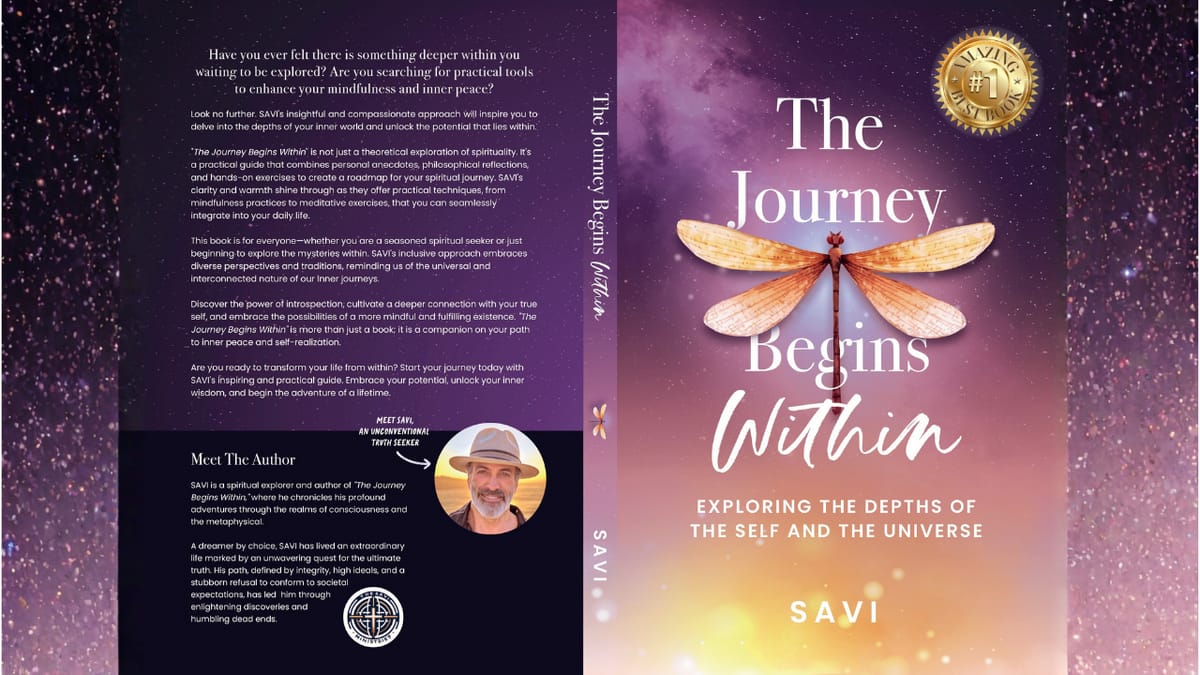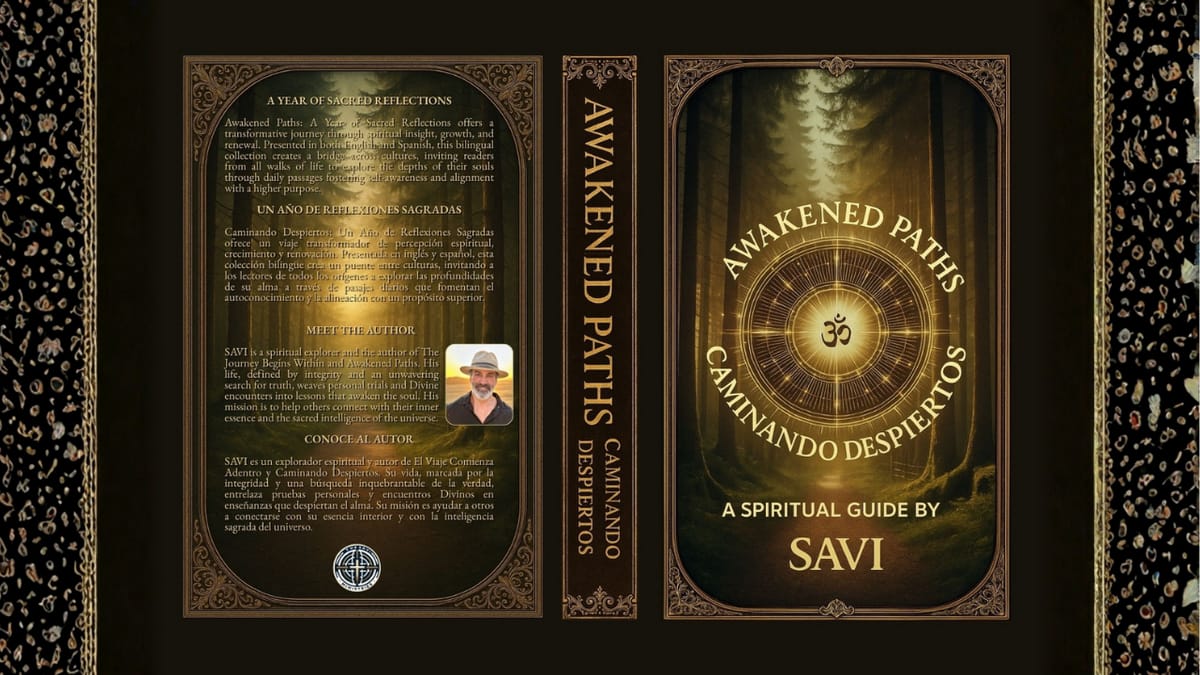A Chapter from The Journey Begins Within by SAVI
Our faith journey is often revealed through the unseen forces shaping our lives—challenges that test us, moments of grace that uplift us, and the whispers of divine guidance leading us forward. Like the rising sun breaking through the night, true transformation comes not through resistance but through surrender to the wisdom of God’s greater plan.
Welcome to The SAVI Ministries Newsletter, where we share spiritual reflections, personal testimonies, and teachings to illuminate the path of faith and inner awakening. This edition presents a chapter from The Journey Begins Within, offering a glimpse into the profound truths that emerge when we trust in divine timing, embrace our trials with courage, and open our hearts to the boundless love that guides us.
Take a moment to pause, reflect, and receive this message—an invitation to walk with faith, knowing that every step leads you closer to your highest calling.
We currently have {{active_subscriber_count}} subscribers and are excited to see our community grow!

“As humans, we are preconditioned to avoid both physical and emotional pain and seek pleasure. From childhood, we are constantly confronted with opportunities to experience both, and as we age, many of us still do not appreciate the subtle differences between pain and suffering. Unfortunately, this leads to the constant seeking of pleasure outside of us via different means while trying to avoid pain. In the most distorted of these outcomes, many resort to compulsory behaviors, which in the extreme may result in various kinds of addictions, from mild to truly devastating.
We all need to understand that pain is a necessary aspect of the human experience, and its constant avoidance may deprive us of one of the most enriching experiences of our lifetimes. All types of pain are unavoidable, from physical to emotional. We will experience it whether we want to or not. The rationalization of this critical fact is the cornerstone for understanding that a spiritually mature individual will, in fact, welcome and embrace pain because it is, in a sense, a compass showing us something that may not be in complete agreement with our lives. On the physical plane, pain shows us a discrepancy between reality and our bodies, pointing us to take corrective action to reverse the course that has led to the pain. In the case of illness, we are forced to take better care of our bodies, which are temples of the soul. In the event of emotional pain, we encounter something similar but with more profound implications, as it forces us to mature emotionally and, first and foremost, accept what is and is not. Both types of pain open the door for a deeper understanding of the optionality of the temporary pain caused by circumstances or the permanent suffering caused by our ego's non-acceptance of what is versus what we expected. In a nutshell, when we realize and accept that most situations in our lives that have caused us pain are entirely beyond our initial control—due to a lack of awareness of the factors that initiated the events and/or the exogenous forces working against our will—we finally allow ourselves to break free from the continuous necessity of accepting suffering as a condition.
We rarely control what enters our lives and do a mediocre job at managing it. As humans, we tend to see reality through the filters of our senses and our expectations of what it should be, instead of simply allowing everything to exist without creating labels. I have seen many people emotionally recover from irreversible physical conditions such as amputations and become more potent versions of who they were. I am no stranger to physical pain; my first vivid encounter happened at three years old when a friend of mine closed a heavy metal door on my hand while playing in his house. The door amputated the end of my left hand's middle finger to the bone. If that wasn’t traumatic enough, my parents took me to a doctor for a year. This doctor, without anesthesia, would unwrap my bandages every Wednesday and thoughtfully cut open the wound so the flesh would grow underneath the nail, restoring some semblance of a standard finger, albeit missing the very tip. Back then, I couldn't understand the pain, and I suffered greatly, both physically and emotionally. Looking back at that younger version of me, I see the valuable lesson in that experience – I now have a semi-normal-looking finger and, indeed, a much stronger character.
When I was fourteen, doctors also discovered a bone tumor the size of a Silver Eagle coin in the head of my left tibia. First, the doctors warned us that it might be cancerous and that I could potentially lose my leg from the knee down. After a very painful biopsy, the results came back negative, thank God! But the tumor still needed to be removed. The surgeons developed a new procedure, which involved prolonged surgery. During this operation, I was given too much anesthesia, and I vividly recall finding myself floating in the top corner of the operating room, looking down at my body, and overhearing the surgeons reconstructing my leg after they had extracted the tumor. This experience gave me one of my first metaphysical insights at a young age. It showed me that we are more than our senses can comprehend and that we are spiritual beings having a human experience.
Back in the recovery room, I remember the excruciating pain that wouldn't subside even with the morphine they were administering. I spent four weeks simply lying in bed without being able to move, during the first two weeks of which the pain was relentless. A few days into recovery, I even asked the doctors to amputate my leg so that the pain would end.
Today, I bear the scars, both in my body and in my heart, of these two events. For many years of my life, I felt somewhat incomplete and imperfect from a physical standpoint, almost feeling undeserving of love since I was not normal anymore. But within a year, I learned to use both of my legs. I proved to the world that I was still a champion, winning several rowing competitions in my home country and the US and even becoming the State Champion in my category, where I measured myself against all other crew members my age in the Midwestern competitions. I had overcome the challenge and learned the difference between pain and suffering on a physical plane. I realized that my body does not define me. We can rise above any physical ailment, including death itself. I know of many who are terminally ill. They find a significant amount of peace before their passing as they accept the finite aspect of life and rejoice in the positive aspects of what they have experienced, except for those who commit suicide who never master the difference between pain and suffering and unfortunately choose to end it all instead of evolving.
In a way, physical pain is somewhat easier to overcome than emotional pain, as the latter tends to linger longer in our hearts. It's often self-induced by the lack of awareness that the universe, or life itself, does not march to the beat of our drum. Instead, events happen for us, not to us, so that we can evolve on our own emotional and spiritual journeys. Emotional and spiritual maturity are optional and only self-realizable with much inner work. Unlike physical maturity, which we all reach by simply aging, how we face life challenges and opportunities determines how well or quickly we attain evolution in these two critical aspects of our being and, essentially, awareness. The key takeaway is that one must accept and surrender to what is to free oneself from the temporary pain caused by the present circumstances and desired life outcomes. In this acceptance, one does not become a renunciant; instead, one embraces the pain, allowing the emotions to permeate the deepest fibers of our being instead of escaping through distraction, addiction, or the compulsory consumption of exogenous things like material goods, experiences, or substances including food, alcohol, or drugs. In the acceptance and the experience of the pain, one must reframe it at our core to symbolize nothing more than guidance for us to become aware of the disconnect between reality and our perceptions. In reframing what is, without placing any meaning or connotation on the events that brought the emotional pain, one finds freedom from continuous suffering. I also know a thing or two about emotional suffering; being a natural empath, not only have I experienced overwhelming personal emotional suffering, but I have also felt the suffering of many others around me. It has been through fighting my demons and coping mechanisms that I've learned these lessons, which I am sharing here today so you may also free yourself from self-induced suffering. Pain is not optional; it's a constant of the human condition and, quite frankly, unavoidable. Still, suffering, on the other hand, is always avoidable as it permanently resides in our minds and never outside of us.
Here is the beauty of the tools I am providing you: if you can reframe the pain you experienced, thus avoiding suffering, you are well on your way to learning a valuable spiritual lesson. We all agreed to come to this earth to experience pain differently and attain the needed growth. Instead of complaining about the curriculum and trying to change the Universe's plan, one can graduate faster by offering less resistance. In surrender, one finds freedom from suffering, realizing that all pain is temporary and, in a way, external to our actions, for the reasons I explained. However, we can avoid suffering ultimately by actively changing our vantage point. By making the sweetest possible lemonade from the lemons that life has brought us, we rise above the physical and emotional planes of existence and master the life lessons brought to us for our benefit.
We become 'jiu-jitsu' masters of life (Jiu-Jitsu - derives from the Japanese “Jū,” meaning 'gentle', and “Jutsu,” meaning 'art'; essentially, Jiu-Jitsu is the 'gentle art'). Instead of trying to impose our will upon the world, we flow atop the waters of every storm that life brings. The understanding that life happens for us, not to us, provides us with a solid foundation to reframe pain and avoid suffering.
This also provides one of the core foundations for accepting ourselves with all our limitations, which is one step closer to experiencing unconditional love for ourselves and others.”
Be Blessed




The Journey Begins Within
Have you ever felt there is something deeper within you waiting to be explored? Are you searching for practical tools to enhance your mindfulness and inner peace? Would you like to expand your conn...

Awakened Paths | Caminando Despiertos
Unlock the sacred rhythm of life with Awakened Paths: A Year of Sacred Reflections, a bilingual journey through lessons that connect the everyday with the divine.

The SAVI Ministries Nature Centered Health & Longevity Protocol
Discover the Path to Holistic Healing and Vitality. Are you ready to reclaim your health, vitality, and purpose? The SAVI Ministries Holistic Model is more than a presentation; it’s a transformativ...










